 Pin on Pro life
Pin on Pro lifePregnancy Calculator can predict pregnancy schedule based on due date is provided, the date of the last period, the date of the ultrasound, the date of conception or IVF transfer date.
Pregnancy is the term used to describe the state of women during the time period (~ 9 months) for one or more offspring develop in a woman. Childbirth usually occurs about 38 weeks after conception, or about 40 weeks after the last menstrual period. The World Health Organization defines normal term pregnancy lasts between 37 and 47 weeks. During the first person OB-GYN visits, the doctor will usually give an approximate date (based sonogram) where the child will be born, or the maturity date. Alternatively, the date can also be estimated based on a person's last menstrual period.
While the maturity date can be estimated, the actual length of pregnancy depends on a variety of factors including age, length of previous pregnancies and maternal weight in birth.1 However, there are still more factors that affect the natural variations in the term pregnancy well understood. Research has shown that less than 4% of births occur on the due date is right, 60% occurred within a week of the due date, and almost 90% occurred within two weeks of date.2 because Therefore, while it is possible to pretty sure that someone's child will be born in about two weeks from the due date, it is currently impossible to predict the exact day of birth with certainty.
pregnancy can be detected either by using a pregnancy test, or by the woman herself noticed a number of symptoms, including a missed menstrual period, an increase in basal body temperature, fatigue, nausea, and increased frequency of urination.
pregnancy tests involving the detection of a hormone that serves as a biomarker for pregnancy and include blood or urine clinical tests that detect pregnancy six to eight days after fertilization. While the clinical blood test is more accurate, and can detect the exact amount of hCG hormone (which is only present during pregnancy) in advance and in a smaller amount, they take more time to evaluate and more expensive than urine pregnancy test at home. It is also possible to obtain clinical urine test, but this is not necessarily more accurate than a home pregnancy test, and potentially could be more expensive.
There are a number of factors that need to be considered during pregnancy, many are highly dependent on the individual situation, such as medicines, weight loss, exercise and nutrition
drug :.
Taking certain medications during pregnancy can have a lasting effect on the fetus. In the US the drug is classified in categories A, B, C, D and X by the Food and Drug Administration (FDA) based on the potential benefit versus the risk of the fetus. Drugs that have positive benefits for women with a low risk to the fetus is classified as category A, while the drug, the risk of significant fetal prove that outweigh the potential benefit to the mother is classified category X. Someone who is pregnant should consult with their physician about the medications they plan to use during their pregnancy
weight :.
Weight loss is largely inevitable aspect and need pregnancies varies between people. This affects many aspects of fetal development such as the weight of the baby, placenta, blood circulation extra fluids and fat and protein stores. Weight management benefits for weight considerations are not sufficient or excess can have negative effects for both mother and fetus, including the need for a cesarean section (C-section) and gestational hypertension. While values vary between women, the Institute of Medicine recommends that the overall pregnancy weight gain of 25-35 pounds for women whose weight is considered "normal" (BMI 18.5 to 24.9), 28-40 pounds for skinny people considered (BMI <18.5), 15-25 pounds for those who are considered overweight (BMI 25 to 29.9), and 11-20 pounds for those who are considered obese (BMI> 30) 0.3 are based on the Institute of Medicine's recommendation.
Training:
Studies have shown that aerobic exercise during pregnancy helps to improve or maintain physical fitness and may reduce the risk of C-section. Although it varies among women, regular aerobic exercise or air power is often recommended for pregnant women, and women who exercised regularly before becoming pregnant, who have an uncomplicated pregnancy, should be able to continue the intense highExercise ity programs.4 The American College of Obstetricians and Gynecologists recommends that it be given a pregnancy without complications, fetal injury is not likely to occur as a result of the exercise. However, caution is advised, and a pregnant woman should consult their doctor if any of these symptoms as follows: vaginal bleeding, shortness of breath, dizziness, headache, calf pain or swelling, leakage of amniotic fluid, decreased fetal movement, labor premature, muscle weakness, or chest pain.5
Nutrition:
Nutrition during pregnancy is very important for maternal and infant health. Pregnancy requires consideration of different nutrients than a person would have in the absence of pregnancy, due to increased energy and micronutrients specific requirements.6
certain vitamins such as vitamin B9, also known as folic acid, tin help decrease risk of certain defects, whereas other nutrients such as DHA omega-3 is required for brain and retinal development can not be produced efficiently by infants, and can only be obtained through the placenta during pregnancy, or in breast milk after birth. There are plenty of other micronutrients that help the proper development of the fetus, and there are myriad sources of information about what pregnant women should or should not eat or do. All information can be different for the filter and can vary from person to person. Pregnant women should consult their doctor and / or nutritionist to help determine the best course of action for their own particular needs.
 Conception calculator pregnancy test, 5 months pregnant cramping ...
Conception calculator pregnancy test, 5 months pregnant cramping ...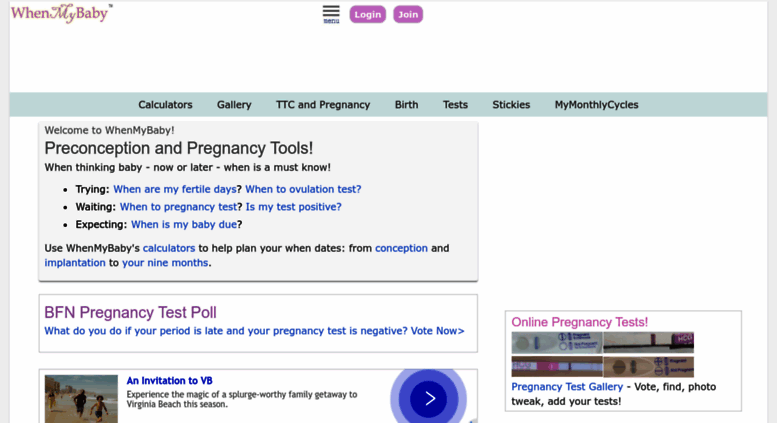 Access whenmybaby.com. Pregnancy Test Calculator, Pregnancy Due ...
Access whenmybaby.com. Pregnancy Test Calculator, Pregnancy Due ... Whenmybaby.com website. Pregnancy Test Calculator, Pregnancy Due ...
Whenmybaby.com website. Pregnancy Test Calculator, Pregnancy Due ... Pin on Baby Growth
Pin on Baby Growth 4 weeks pregnant: Symptoms, hormones, and baby development
4 weeks pregnant: Symptoms, hormones, and baby development Pin on MPCA7/1/81 1 baby 18 weeks in my Woum (1month= 4 weeks
Pin on MPCA7/1/81 1 baby 18 weeks in my Woum (1month= 4 weeks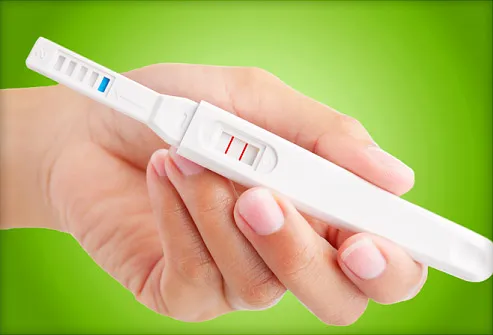 Pregnancy Tests: When to Take One, Accuracy, and Results
Pregnancy Tests: When to Take One, Accuracy, and Results Pin on Being Mommy
Pin on Being Mommy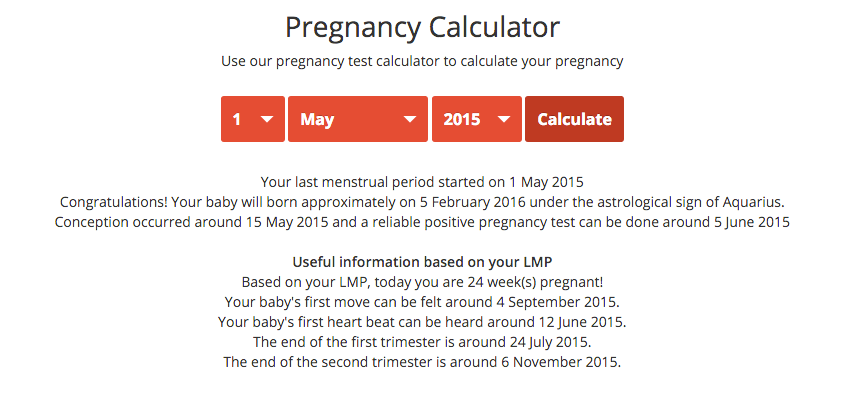 Pregnancy Test Calculator By Conception - Blackmores Pregnancy
Pregnancy Test Calculator By Conception - Blackmores Pregnancy Pregnancy Calculator | Pregnancy Test Calculator | Home Pregnancy Test
Pregnancy Calculator | Pregnancy Test Calculator | Home Pregnancy Test Ovulation Calculator | Download Your Ovulation Calendar | Mother&Baby
Ovulation Calculator | Download Your Ovulation Calendar | Mother&Baby What Are the Signs of Pregnancy? – Easy@Home Fertility
What Are the Signs of Pregnancy? – Easy@Home Fertility 4 weeks pregnant: Symptoms, hormones, and baby development
4 weeks pregnant: Symptoms, hormones, and baby development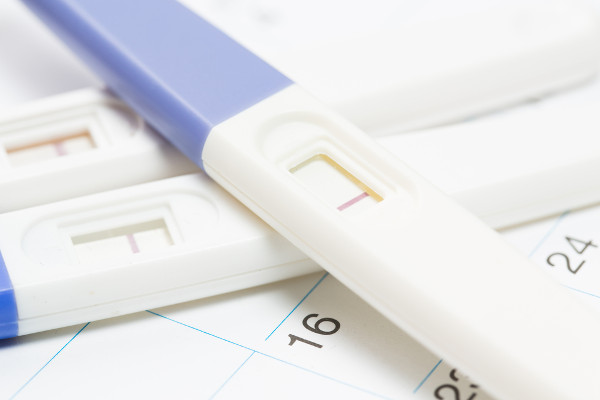 Calculators - Countdown to pregnancy
Calculators - Countdown to pregnancy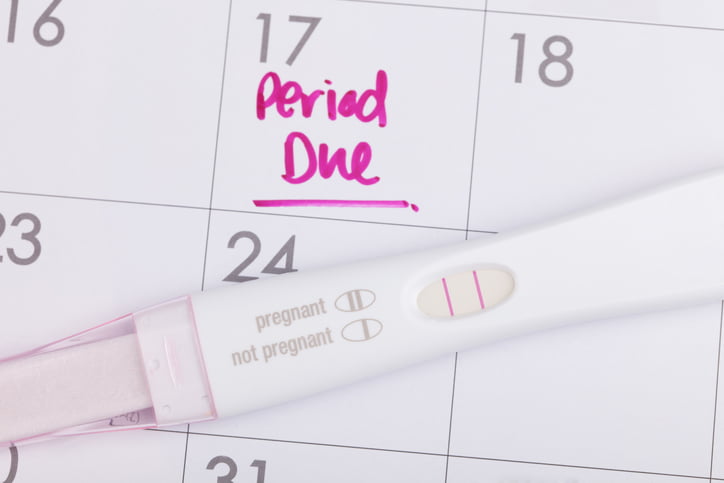 Is It Possible to Get a False Positive on a Pregnancy Test? | Dazz ...
Is It Possible to Get a False Positive on a Pregnancy Test? | Dazz ... How Far Along Am I? | First Response Pregnancy Calculator | First ...
How Far Along Am I? | First Response Pregnancy Calculator | First ... Pregnancy Week by Week — How to get pregnancy — EasyToBeMom
Pregnancy Week by Week — How to get pregnancy — EasyToBeMom Pregnancy Test Calculator By Conception - Blackmores Pregnancy
Pregnancy Test Calculator By Conception - Blackmores Pregnancy Best Pregnancy Tests 2019 - Best Home Pregnancy Tests
Best Pregnancy Tests 2019 - Best Home Pregnancy Tests Amazon.com: Pregnancy Test Early, Docalon 2 Count Clear and ...
Amazon.com: Pregnancy Test Early, Docalon 2 Count Clear and ...%2C445%2C291%2C400%2C400%2Carial%2C12%2C4%2C0%2C0%2C5_SCLZZZZZZZ_.jpg) Amazon.com: Easy@Home 50 Ovulation Test Strips and 20 Pregnancy ...
Amazon.com: Easy@Home 50 Ovulation Test Strips and 20 Pregnancy ... 24 Weeks Pregnant- Better Than Ever! - YourBabyLibrary | 25 weeks ...
24 Weeks Pregnant- Better Than Ever! - YourBabyLibrary | 25 weeks ... Pregnancy calculator provides the date of birth of the baby
Pregnancy calculator provides the date of birth of the baby Pregnancy Due Date Calculator
Pregnancy Due Date Calculator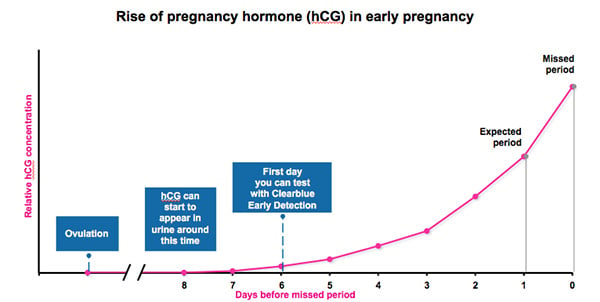 How soon can I take a pregnancy test | Clearblue
How soon can I take a pregnancy test | Clearblue Pregnancy Due Date Calculator: How Many Weeks Pregnant Am I?
Pregnancy Due Date Calculator: How Many Weeks Pregnant Am I?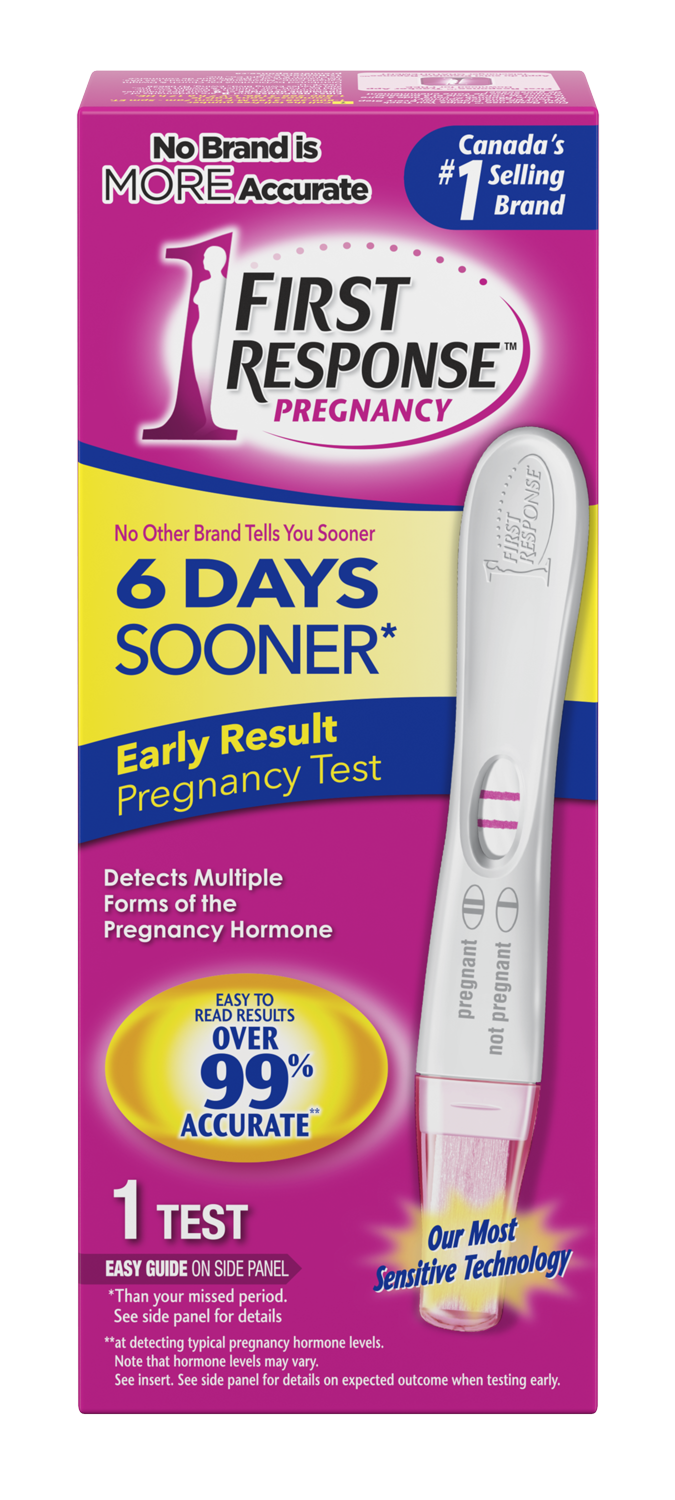 Early Detection Pregnancy Test | Triple-Check Pregnancy Test Kit ...
Early Detection Pregnancy Test | Triple-Check Pregnancy Test Kit ... Our FIRST RESPONSE™ Pregnancy Tests - no brand tells you sooner.
Our FIRST RESPONSE™ Pregnancy Tests - no brand tells you sooner.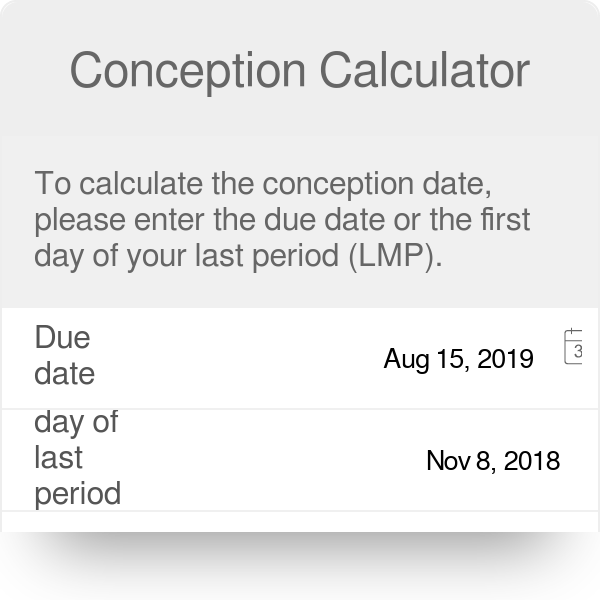 Conception Date Calculator | When Did I Conceive? - Omni
Conception Date Calculator | When Did I Conceive? - Omni What Is Really A Pregnancy Payment Date Calculator?... by ...
What Is Really A Pregnancy Payment Date Calculator?... by ... Ovulation Calculator - The Bump
Ovulation Calculator - The Bump Dating your Pregnancy | The MotHERS Program™
Dating your Pregnancy | The MotHERS Program™ Ovulation Calculator | Download Your Ovulation Calendar | Mother&Baby
Ovulation Calculator | Download Your Ovulation Calendar | Mother&Baby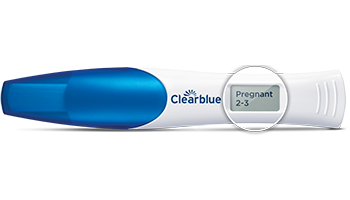 Clearblue pregnancy tests
Clearblue pregnancy tests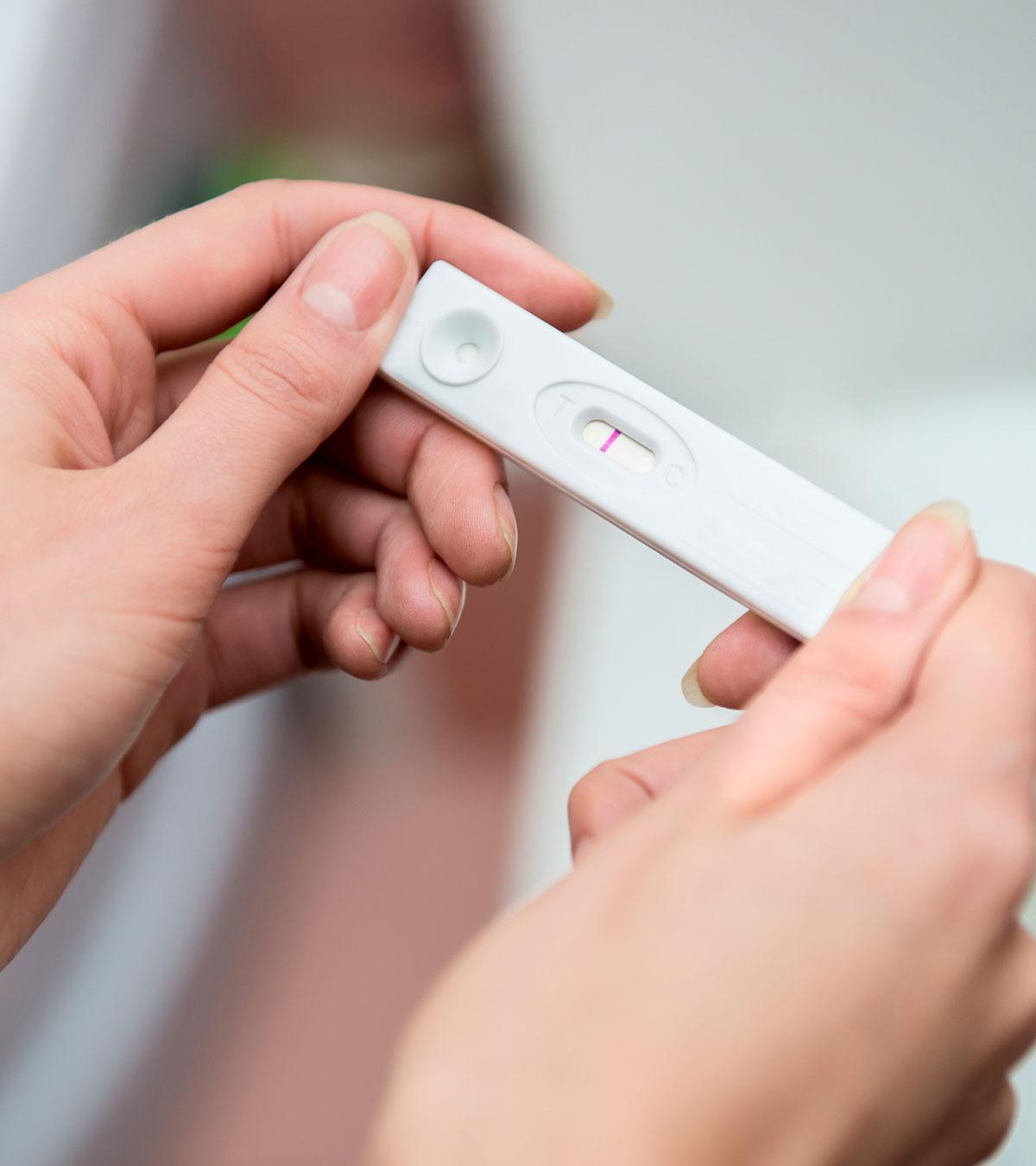 Dollar Store Pregnancy Test - Do They Really Work?
Dollar Store Pregnancy Test - Do They Really Work? Ovulation calculator the best Amazon price in SaveMoney.es
Ovulation calculator the best Amazon price in SaveMoney.es Pregnancy Test Calculator
Pregnancy Test Calculator Due Date Calculator| Calculate EDD By Conception Date
Due Date Calculator| Calculate EDD By Conception Date What Are Your Chances Getting Pregnant?
What Are Your Chances Getting Pregnant? Faint Line on a Pregnancy Test: What Does It Mean?
Faint Line on a Pregnancy Test: What Does It Mean? Pregnancy Due Date Calculator | Live Better
Pregnancy Due Date Calculator | Live Better Conception Calculator: Find The Date You CONCEIVED and Your DUE DATE
Conception Calculator: Find The Date You CONCEIVED and Your DUE DATE Ovulation Midstream Test Results and Instructions - www.early ...
Ovulation Midstream Test Results and Instructions - www.early ... Chinese Gender Predictor Chart
Chinese Gender Predictor Chart Facts about pregnancy and exercise, pregnancy week calculator ...
Facts about pregnancy and exercise, pregnancy week calculator ... 1 Week Pregnant: Symptoms, Tips, Baby Development
1 Week Pregnant: Symptoms, Tips, Baby Development Pregnancy tests | Pregnancy Birth and Baby
Pregnancy tests | Pregnancy Birth and Baby How soon can you get pregnant after having a baby?
How soon can you get pregnant after having a baby? Due Date Calculator | Pregnancy Calculator | BabyCenter
Due Date Calculator | Pregnancy Calculator | BabyCenter Implantation Calculator | babyMed.com
Implantation Calculator | babyMed.com Early pregnancy symptoms: First signs you might be pregnant - Kidspot
Early pregnancy symptoms: First signs you might be pregnant - Kidspot Due date calculator – Pregnancy Info
Due date calculator – Pregnancy Info Pregnancy Testing Strips Easy@Home – Easy@Home Fertility
Pregnancy Testing Strips Easy@Home – Easy@Home Fertility
Posting Komentar
Posting Komentar